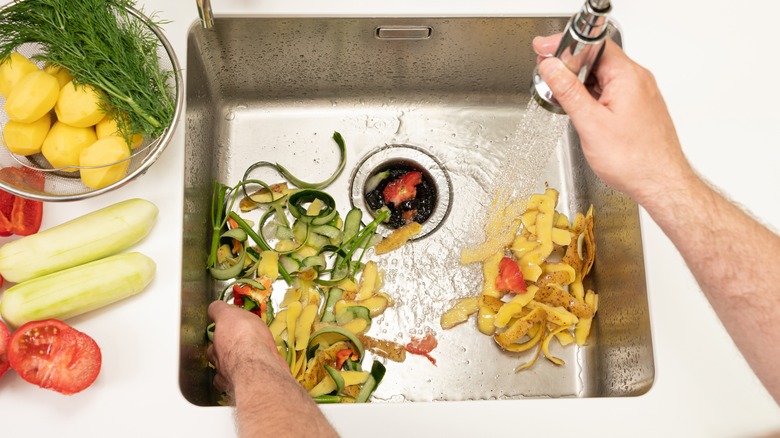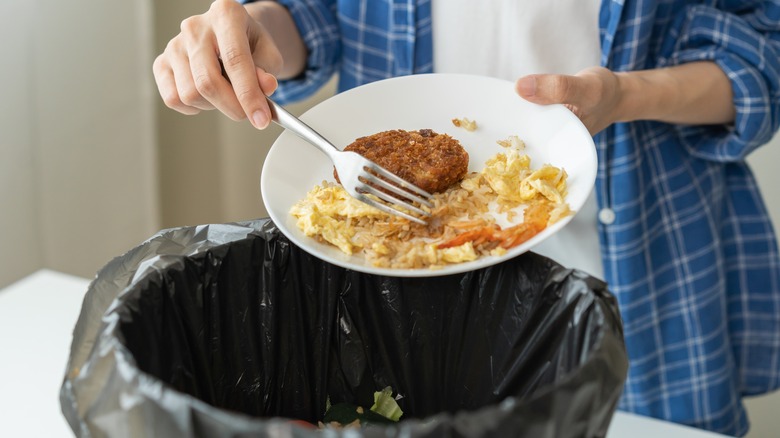Avoid Letting This Common Condiment Go Down The Drain At All Costs
Picture this: your six-year-old sneaks a burning aromatherapy candle to your kitchen sink and pours the melted wax down the drain. You know, hypothetically. If you think for a minute, you can predict what happens next, and you can probably predict where it will happen. The liquid wax will make it to the drain's P trap, hit the cool water there, and solidify into a plug that clogs the sink instantly. This is a high-speed (and perhaps slightly on-the-nose) metaphor for what happens when you wash the popular condiment, mayonnaise, down your kitchen sink. The stuff congeals, collects other oils and whatever else will stick to it, and begins to build up, contributing to an eventual clog.
In some ways, the mayo scenario is worse than the candle scandal. It can stick to your drain pipes anywhere along the way to the sewer main, including points well beyond the reach of a pipe wrench. Mayo does have a small amount of saturated fat that tends to be solid at room temperature, and the mixture of vegetable oils, egg yolks, and other ingredients has a slightly thick texture by default. But the real problem is that the oil used to make mayo sticks to pipes and all the stuff you periodically wash down them, like bread crumbs, wedding rings, and especially other oils. It turns out that oil is the problem, and you should do everything you can to keep oils out of your sink's drain lines.
This includes your garbage disposal
We know what you're thinking. Or, more to the point, we know what we were originally thinking: why not just glop the mayo into the garbage disposal, turn on the blades of destruction and some hot water, and let the disposal do its thing? Well, it turns out that mayonnaise joins the rest of the nearly endless list of garbage you can't dispose of using a garbage disposal. In fact, cooking oils are number one on the list of things you should never dispose of in a garbage disposal, along with some parts of onions, starchy foods, paint, and broken glass. If you're putting broken glass into your disposal, we should probably also warn you against attempting to grind up horseshoes, mufflers, leather goods, and old phones. (If you do manage to get it in there, by the way, to safely remove glass from your garbage disposal, use pliers and a vacuum.)
Putting mayo in a garbage disposal just kicks the can down the road – or the clog down the drain. Whipping it into a froth with the disposal blades won't change its basic oily nature, and it's just going to get stuck somewhere further down the line. Using hot water is tempting to rinse down oils and fats, but it will only make the problem worse by temporarily liquifying fats and helping them to get deeper into your plumbing before cooling off and forming a blockage.
How to dispose of mayonnaise properly
So where does mayo go, if not down the drain? Perhaps unsurprisingly, the best place for it is usually in the trash, since composting oily foods at home is a bad idea. They don't decompose quickly, and often end up attracting animals and other pests. While some recycling centers will take cooking oils, mayo isn't typically what they have in mind. On the other hand, because oily items like mayonnaise can be commercially composted, some municipalities will accept food waste in curbside organics carts, which are often green and are sometimes referred to as "green waste" carts.
Customers of organics composting services like ReCollect are encouraged to compost food items like mayonnaise, which they say will avoid the unnecessary release of methane gas as the food breaks down in local landfills. But when Michigan State University needed to dispose of 10,000 pounds of bad mayo, methane is exactly the option they pursued. The university processed the mayo in anaerobic "digesters" designed to convert agricultural waste like cow manure into methane, and then into usable electricity. But unless you find yourself with 5 tons of mayo to deal with, it's probably best to simply put it in your trash.


